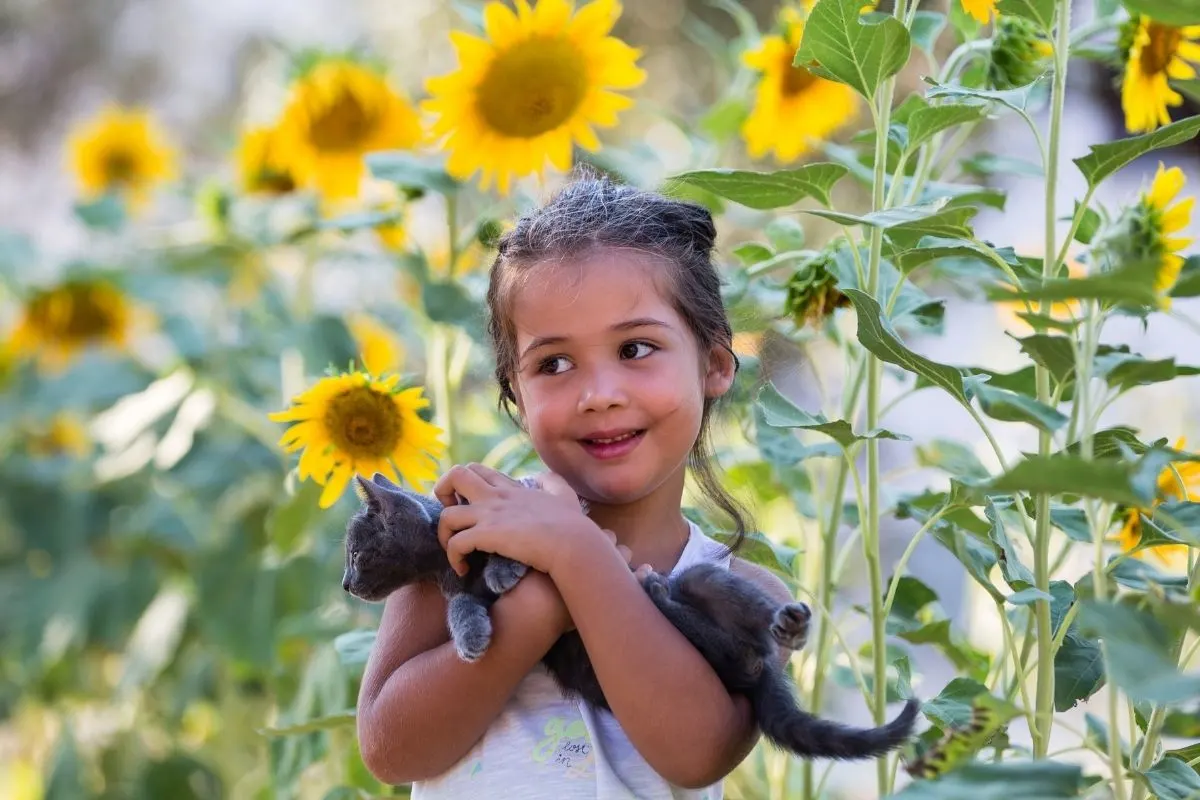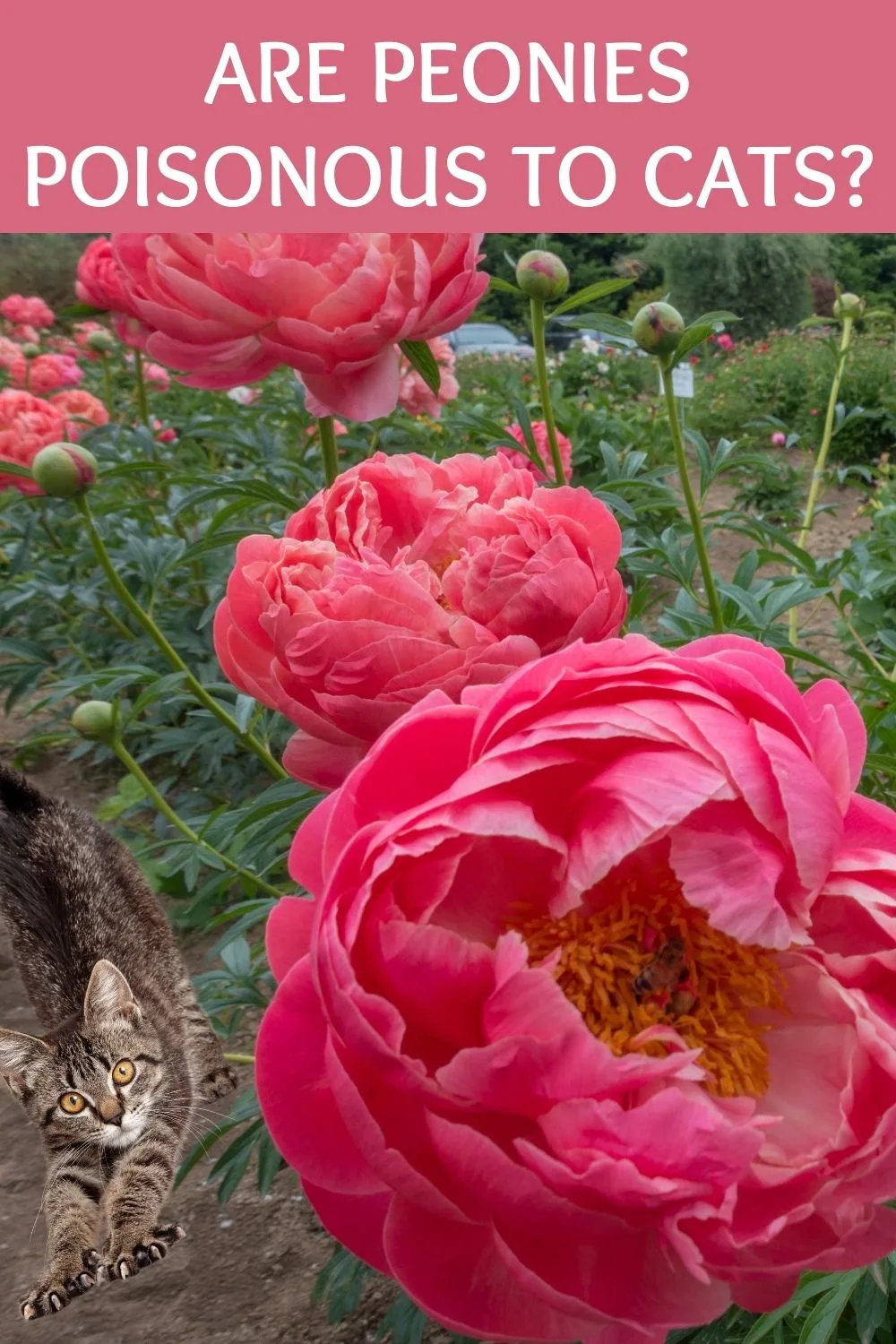Peonies are extremely popular with gardeners. Their blooms are extravagant in both size and color, creating an attractive feature in the garden. There are numerous peony species with wide-ranging colors and growth habits to choose from. Although these plants are beautiful and beloved by gardeners, are peonies poisonous to cats?
Peonies contain a substance known as paeonol, which is found in the stem of the plant. Paeonol is poisonous to cats if consumed in large quantities. As cats do not generally chew plant stems or swallow large amounts of plant matter, the risk of peony poisoning in cats is minimal.

Whether we are putting plants in our garden or keeping houseplants, it is vital to know the risk the plants pose to our pets. Cats have sensitivities to chemicals that may not be seen in other animals and this is why they react to certain toxic plants when other animals don’t. So we must investigate specifically whether the plants are safe for our cats.
Will My Cat Eat My Peonies?
Cats are obligate carnivores. This term means that they get all their nutrients from meat. They have no dietary need to eat plants, so a cat chewing on plants does so for another reason. Cats are not particularly attracted to peonies, but some may bite or chew the plants.
Kittens and playful adult cats may chew or bite plants if they see the leaves or flowers moving in a breeze. The cat or kitten pounces and wrestles with the plant, which may include biting the plant.
Cats may be bored and eat plants to alleviate their boredom. They could be attracted to the texture of the plant or accidentally bite the leaves when chasing an insect.
Cats with health issues or inadequate diet may be prone to abnormal behavior such as eating foreign items. If your cat persists in eating strange objects and plants, make an appointment with your veterinarian to check its health.
Are Peonies Poisonous To Cats?
Peony leaves and flowers do not contain any harmful substances. The stem and root bark contain a substance known as paeonol. Paeonol has anti-inflammatory and pain-relieving properties and is used in Chinese medicine.
Cats are sensitive to many anti-inflammatories, and ingestion of large amounts would cause a toxic reaction. Peony poisoning in cats is unlikely to occur for two reasons:
- Cats seldom ingest large quantities of plant matter.
- Cats usually bite the leaves or flowers of a plant, and the cat would therefore not consume any paeonol.
Are Some Cats More Sensitive To Poisons Than Others?
Individual allergies are always possible in cats, just as they are in humans and dogs. A cat allergic to peonies or paeonol would show allergy symptoms such as hives, swelling, itching, and labored breathing.
Cats with compromised kidney function will be more at risk of poisoning. The kidneys are responsible for removing toxins from the body. If the toxins are not removed, there is a build-up of toxins, or the poison stays in the cat’s system for longer, creating more severe symptoms.
Cats with any chronic health condition such as feline AIDS will also be more at risk of responding adversely to paeonol.
What Are The Symptoms Of Peony Poisoning In Cats?
Symptoms of peony poisoning would include:
- Drooling
- Vomiting
- Excessive urination or the inability to urinate
- Diarrhea
- Lethargy
- Depression
- Abnormal gait and balance
- Seizures
It is unlikely that the cat that eats peonies will show these symptoms unless they eat the stem, bark, or roots. These symptoms may also be a result of poisoning from insecticides or fertilizers used on the peonies.
Stomach upsets are a common symptom when your feline friend has ingested something they shouldn’t. Abdominal pain is also very common. In some of the worst cases, kidney failure or liver failure can occur. This is why it is so important to know how to identify poisonous plants and prevent accidents like this from happening.
Even if you do not use toxic pesticides on your plants, be aware that plant nurseries may use topical spray on peonies or systemic insecticides. Systemic insecticides such as organophosphates are injected into the soil. These insecticides are absorbed into the plant and may be present for a considerable time.
Nitrogen, phosphorous, and potassium fertilizers can cause gastrointestinal symptoms if the cat ingests them.
What Is The Treatment For A Cat Poisoned By Peonies?
Talk to your vet and see if inducing vomiting would be recommended if possible. This can be done by using 3% (not hair coloring strength) hydrogen peroxide following your vet’s instructions.
If our cat shows a lot of distress, it should be taken immediately to the veterinarian for further treatment and assessment. The vet will probably insert an IV catheter and set up a drip line to flush out the toxins. The vet may also provide medications to support the liver and kidneys and control other symptoms.
Cat owners have an obligation to their pets to keep them safe. When it comes to flowers for cats, it’s best not to take any chances.
Flowering Plants That Are Cat Safe

Peonies are relatively safe for cats and peony poisoning is rare in cats. If you have a plant munching cat or prefer to be cautious, try some alternative flowers that can be used for color in the garden.
These flowering plants are cats safe:
- Roses
- Freesias
- Orchids
- Snapdragons
- Asters
- Sunflowers
- Madagascar Jasmine
How To Stop A Cat Eating Peonies?
If your cat is prone to eating plants, choose one of the cat-safe plants. You could also provide the cat with pet grass or catnip (nepeta cataria). Catnip and pet grass will attract your cat away from the peonies.
Stimulate your cat’s mind by teaching your cat tricks. You can also install wind-driven toys that will distract your cat from the plants in the garden. Squeaky toys, balls, and any toy that moves will also keep your cat’s attention.
Some people find success in putting things in the plants that your cat will not like as a deterrent. For example, many cats hate cayenne pepper and other spicy scents and flavors. If you put them in or around your plants, it could be enough to keep your cats away.
Are Peonies Poisonous To Cats? – Conclusion
Peony leaves and flowers are not toxic to cats. The stem and root bark contain paeonol, which is toxic when ingested in large quantities. As cats seldom eat an entire plant but are more prone to biting a leaf or flower, it is unlikely that your cat will be poisoned by peonies. Pet owners who also keep indoor plants need to know about these risks in order to prevent them.
Insecticides and fertilizers used on peonies can be toxic and provoke symptoms of toxicity in cats. If your cat shows any indication of poisoning or appears unwell, it is always best to have it assessed by a veterinarian. If you keep your cat indoors, what do you do to provide a safe environment for him?

Adriana Copaceanu is a passionate nature lover living in the country on her dream property where she grows vegetables, lavender, and wildflowers that she shares with the wildlife they attract. When she's not in the garden, she loves spending time with her chickens and planning her next nature project. Check out her books below:
How to Grow Lavender for Fun and Profit: Lessons Learned from Planting Three Hundred Lavender Plants

